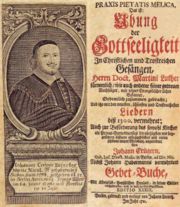
Johann Crüger
Encyclopedia

Composer
A composer is a person who creates music, either by musical notation or oral tradition, for interpretation and performance, or through direct manipulation of sonic material through electronic media...
of well-known hymn
Hymn
A hymn is a type of song, usually religious, specifically written for the purpose of praise, adoration or prayer, and typically addressed to a deity or deities, or to a prominent figure or personification...
s.
Crüger was born in Groß Breesen (now part of Guben
Guben
Guben is a town on the Lusatian Neisse river in the state of Brandenburg, Germany. Located in the Spree-Neiße district, Guben has a population of 20,049...
) as the son of an inn
INN
InterNetNews is a Usenet news server package, originally released by Rich Salz in 1991, and presented at the Summer 1992 USENIX conference in San Antonio, Texas...
keeper. He studied at the Lateinschule
Lateinschule
Latin school was the grammar school of 14th to 16th century Europe, though the latter term was much more common in England. Emphasis was placed, as the name indicates, on learning to use Latin. The education given at Latin schools gave great emphasis to the complicated grammar of the Latin...
in Guben until 1613, after which he traveled to Sorau and Breslau and finally to Regensburg
Regensburg
Regensburg is a city in Bavaria, Germany, located at the confluence of the Danube and Regen rivers, at the northernmost bend in the Danube. To the east lies the Bavarian Forest. Regensburg is the capital of the Bavarian administrative region Upper Palatinate...
, where he received his first musical training from Paulus Homberger. In 1615 he traveled to Berlin
Berlin
Berlin is the capital city of Germany and is one of the 16 states of Germany. With a population of 3.45 million people, Berlin is Germany's largest city. It is the second most populous city proper and the seventh most populous urban area in the European Union...
, where he studied theology
Theology
Theology is the systematic and rational study of religion and its influences and of the nature of religious truths, or the learned profession acquired by completing specialized training in religious studies, usually at a university or school of divinity or seminary.-Definition:Augustine of Hippo...
at the Berlinisches Gymnasium zum Grauen Kloster
Berlinisches Gymnasium zum Grauen Kloster
The Berlinisches Gymnasium zum Grauen Kloster is the oldest Gymnasium in Berlin and continues to this day as the Evangelisches Gymnasium zum Grauen Kloster. It is a private school with a humanistic profile and known as one of the most prestigious schools in Germany...
. From 1620 he studied theology at the University of Wittenberg and trained himself further in music through private study. From 1622 to his death, a period of 40 years, he was simultaneously a teacher at gymnasium
Gymnasium (school)
A gymnasium is a type of school providing secondary education in some parts of Europe, comparable to English grammar schools or sixth form colleges and U.S. college preparatory high schools. The word γυμνάσιον was used in Ancient Greece, meaning a locality for both physical and intellectual...
Zum Grauen Kloster and cantor
Cantor (church)
A cantor is the chief singer employed in a church with responsibilities for the ecclesiastical choir; also called the precentor....
of the Nikolaikirche
Nikolaikirche (Berlin)
The Church of St. Nicholas is the oldest church in Berlin, the capital of Germany. The church is located in the eastern part of central Berlin, the borough of Mitte...
in Berlin.
Crüger composed numerous concert works and wrote extensively on music education. In 1643 he became acquainted with the famous hymn writer Paul Gerhardt
Paul Gerhardt
Paul Gerhardt was a German hymn writer.-Biography:Gerhardt was born into a middle-class family at Gräfenhainichen, a small town between Halle and Wittenberg. At the age of fifteen, he entered the Fürstenschule in Grimma. The school was known for its pious atmosphere and stern discipline...
, for whom he wrote the music for various hymns. In 1647 he edited the most important German Lutheran hymnal of the 17th century, Praxis pietatis melica.
External links
- Johann Crüger biography in the Phonoarchive Grove
- Dietrich Nummert, Kantor und Lehrer Johann Crüger
- Free scores at the Mutopia ProjectMutopia projectThe Mutopia Project is a volunteer-run effort to create a library of free content sheet music, in a way similar to Project Gutenberg's library of public domain books.The music is reproduced from old scores that are out of copyright...

